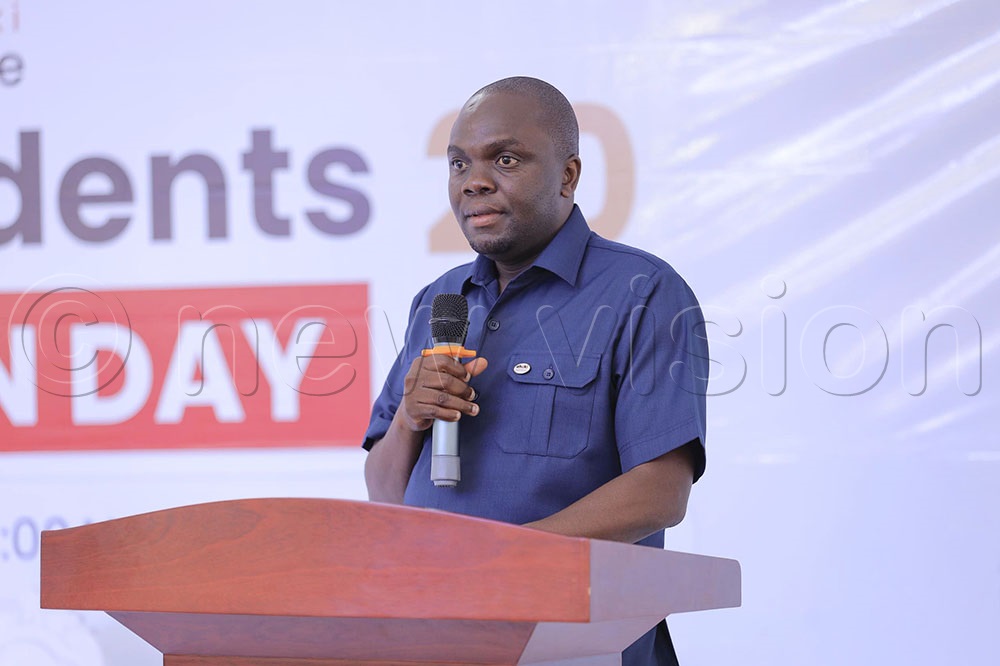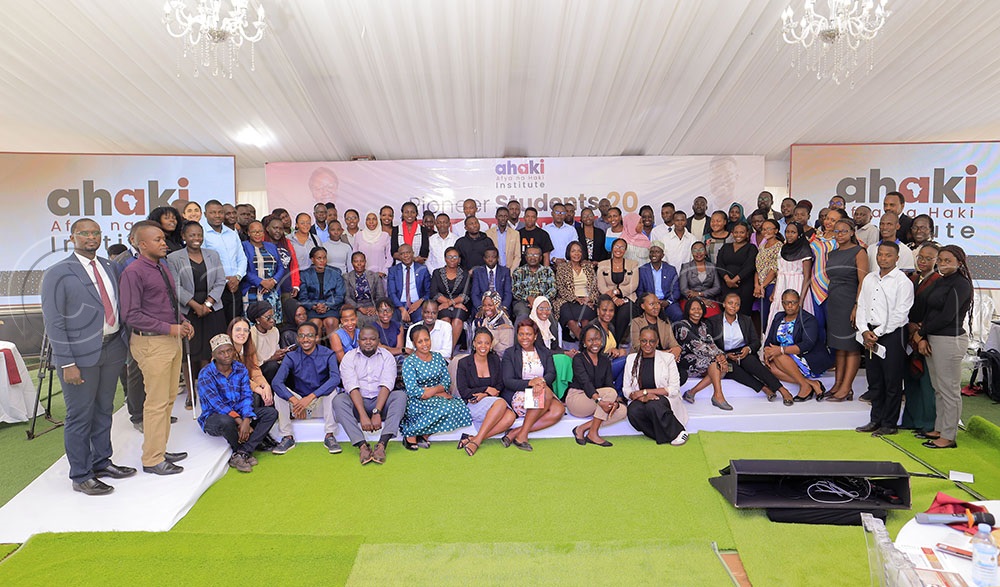Students warned against relying on AI for academic work
“We do not discourage you from using AI, but use AI at a minimum level to allow your original thinking,” Baguma noted.
The acting Dean of Students Alimah Komuhangi, at Ahaki Institute speaking, flanked by Christopher Baguma and Ibrahim Nserekoduring, the Pioneer students' orientation at Ahaki Institute on Monday. (Credit: Agnes Kyotalengerire)
Sexual reproductive health and social justice academia has warned students against relying on use of Artificial intelligence (AI) for their academic work.
In the new era where technologies such as artificial Intelligence (AI) have come into play to do work that the human mind cannot do, it is critical for students not to solely rely on AI.
Instead, they should use their academic thought, initiative and excellence, the Dean of Students at Ahaki Afya na Haki, Christopher Baguma, has said.
“We do not discourage you from using AI, but use AI at a minimum level to allow your original thinking,” Baguma noted.
He urged students to use their creativity, innovation that is rooted in the Afrocentric-African philosophy, and not the creativity and innovation that is rooted in technology.
Baguma further noted that with advancement in technology, the Ahaki Institute has put in place systems which detect AI-generated assignments. This will deter students from being swayed away with the use of AI.
The chairperson board of trustees at Ahaki Afya na Haki, Prof. Ben Twinomugisha, said AI is very helpful and it provides a lot of information. However, both teachers and learners should find ways to tackle possibilities of plagiarism, Twinomugisha noted.
He further noted that some of the information is wrong, considering that AI relies on the existing databases, some of which are shoddy, not even peer-reviewed or accredited.
“He advised the learner and teacher to ensure that they always cross-check the integrity of the materials generated by AI.
The director general of Ahaki Afya na Haki, Prof Moses Mulumba. (Credit: Agnes Kyotalengerire)
This was during the inaugural student orientation at Ahaki Afya na Haki Institute in Nakweru on Gayaza road on August 11, 2025. Ahaki is a specialised institute that sits between health systems and social justice.
A total of 110 students selected from a pool of over 500 applications from 32 countries embarked on their life-changing career in the field of sexual and reproductive health.
Angola, Lesotho, Benin, Burundi, Cameroon, Canada, DRC, Estonia, Ethiopia, Ghana, India, Kenya, Liberia, Madagascar, Malawi, Mali, Botswana, Mozambique, Namibia, Nigeria, Niger, Rwanda, Senegal, Sierra Leone, Somali, South Africa, Sudan, Swaziland, Tanzania, Uganda, Zambia & Zimbabwe.
In their first intake, the institute has two programs: the Bachelor of sexual and Reproductive Health and a Postgraduate Diploma in sexual and Reproductive Health for professionals who are already practising.
“We want to polish your skills to be able to shape polices, practices, the agenda, to reform our health systems and social justice issues in our country,” said the acting Dean, School of Health Policy and Administration Ibrahim Nsereko.
Nsereko further noted that the students are joining a big community that is going to be growing over the years.
‘A community that is shaping the future of health systems, the future of our policies in Africa. Equity in service delivery and in all our social initiatives in the countries and communities,” he said.

Students and the staff of Ahaki after the orientation at their campus in Nakweru. (Credit: Agnes Kyotalengerire)
Tell stories using African approaches
The director general of Ahaki Afya na Haki, Prof. Moses Mulumba, urged students to think through a decolonial lens while embracing Africentric –African approaches, given that for so many years Africa has been told that what it had was bad.
“We need to be grounded as Africans, and understand our history as Africans, get back to know what is positive on the continent and build on it”, Prof. Mulumba noted.
There is history in health systems, for instance, why nursing is as it is, and not to mention value in understanding African institutions, he said.
The acting Dean of Students, Alimah Komuhangi, at Ahaki Institute, agreed.
Komuhangi rallied the students to look at African positive narratives and lean on them.
She advised them to tell their own stories using Art and also look at journals such as the African Journal for Health and Social Justice.
“We are changing the narrative from the Eurocentric way of doing things to the Africentric approach of using indigenous knowledge to find solutions tailored to our needs specifically,” Komuhangi noted.